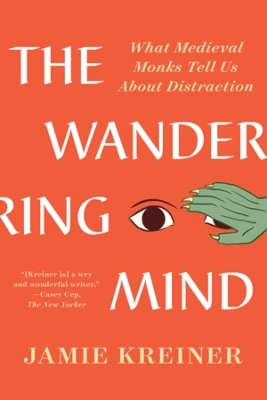
The Wandering Mind
What Medieval Monks Tell Us About Distraction
Seiten
2024
WW Norton & Co (Verlag)
978-1-324-09444-9 (ISBN)
WW Norton & Co (Verlag)
978-1-324-09444-9 (ISBN)
A revelatory account of how Christian monks identified distraction as a fundamental challenge—and how their efforts to defeat it can inform ours, more than a millennium later
Although we think of early monks as master concentrators, a life of mindfulness did not, in fact, come to them easily. As historian Jamie Kreiner demonstrates in The Wandering Mind, their attempts to stretch the mind out to God—to continuously contemplate the divine order and its ethical requirements—were all-consuming, and their battles against distraction were never-ending. Delving into the experiences of early Christian monks living in the Middle East, around the Mediterranean, and throughout Europe from 300 to 900 CE, Kreiner shows that these men and women were obsessed with distraction in ways that seem remarkably modern. At the same time, she suggests that our own obsession is remarkably medieval. Ancient Greek and Roman intellectuals had sometimes complained about distraction but it was early Christian monks who waged an all-out war against it. The stakes could not have been higher: they saw distraction as a matter of life and death.
Even though the world today is vastly different from the world of the early Middle Ages, we can still learn something about our own distractedness by looking closely at monks’ strenuous efforts to concentrate. Drawing on a trove of sources that the monks left behind, Kreiner reconstructs the techniques they devised in their lifelong quest to master their minds—from regimented work schedules and elaborative metacognitive exercises to physical regimens for hygiene, sleep, sex and diet. She captures the fleeting moments of pure attentiveness that some monks managed to grasp, and the many times when monks struggled and failed and went back to the drawing board. Blending history and psychology, The Wandering Mind is a witty, illuminating account of human fallibility and ingenuity that bridges a distant era and our own.
Although we think of early monks as master concentrators, a life of mindfulness did not, in fact, come to them easily. As historian Jamie Kreiner demonstrates in The Wandering Mind, their attempts to stretch the mind out to God—to continuously contemplate the divine order and its ethical requirements—were all-consuming, and their battles against distraction were never-ending. Delving into the experiences of early Christian monks living in the Middle East, around the Mediterranean, and throughout Europe from 300 to 900 CE, Kreiner shows that these men and women were obsessed with distraction in ways that seem remarkably modern. At the same time, she suggests that our own obsession is remarkably medieval. Ancient Greek and Roman intellectuals had sometimes complained about distraction but it was early Christian monks who waged an all-out war against it. The stakes could not have been higher: they saw distraction as a matter of life and death.
Even though the world today is vastly different from the world of the early Middle Ages, we can still learn something about our own distractedness by looking closely at monks’ strenuous efforts to concentrate. Drawing on a trove of sources that the monks left behind, Kreiner reconstructs the techniques they devised in their lifelong quest to master their minds—from regimented work schedules and elaborative metacognitive exercises to physical regimens for hygiene, sleep, sex and diet. She captures the fleeting moments of pure attentiveness that some monks managed to grasp, and the many times when monks struggled and failed and went back to the drawing board. Blending history and psychology, The Wandering Mind is a witty, illuminating account of human fallibility and ingenuity that bridges a distant era and our own.
Jamie Kreiner is a historian of the early Middle Ages and associate professor of history at the University of Georgia. Her work on the early Middle Ages examines the politics, ethics, and scientific sensibilities of those underappreciated centuries. She lives in Athens, Georgia.
| Erscheinungsdatum | 19.12.2023 |
|---|---|
| Zusatzinfo | 30 black-and-white images throughout |
| Verlagsort | New York |
| Sprache | englisch |
| Maße | 140 x 208 mm |
| Gewicht | 227 g |
| Themenwelt | Sachbuch/Ratgeber ► Gesundheit / Leben / Psychologie ► Esoterik / Spiritualität |
| Geschichte ► Allgemeine Geschichte ► Vor- und Frühgeschichte | |
| Geisteswissenschaften ► Geschichte ► Regional- / Ländergeschichte | |
| Geisteswissenschaften ► Psychologie | |
| Religion / Theologie ► Christentum ► Kirchengeschichte | |
| ISBN-10 | 1-324-09444-3 / 1324094443 |
| ISBN-13 | 978-1-324-09444-9 / 9781324094449 |
| Zustand | Neuware |
| Informationen gemäß Produktsicherheitsverordnung (GPSR) | |
| Haben Sie eine Frage zum Produkt? |
Mehr entdecken
aus dem Bereich
aus dem Bereich
auf den Spuren der frühen Zivilisationen
Buch | Hardcover (2023)
C.H.Beck (Verlag)
20,00 €
Was Pompeji über uns erzählt
Buch | Hardcover (2023)
Propyläen (Verlag)
32,00 €


